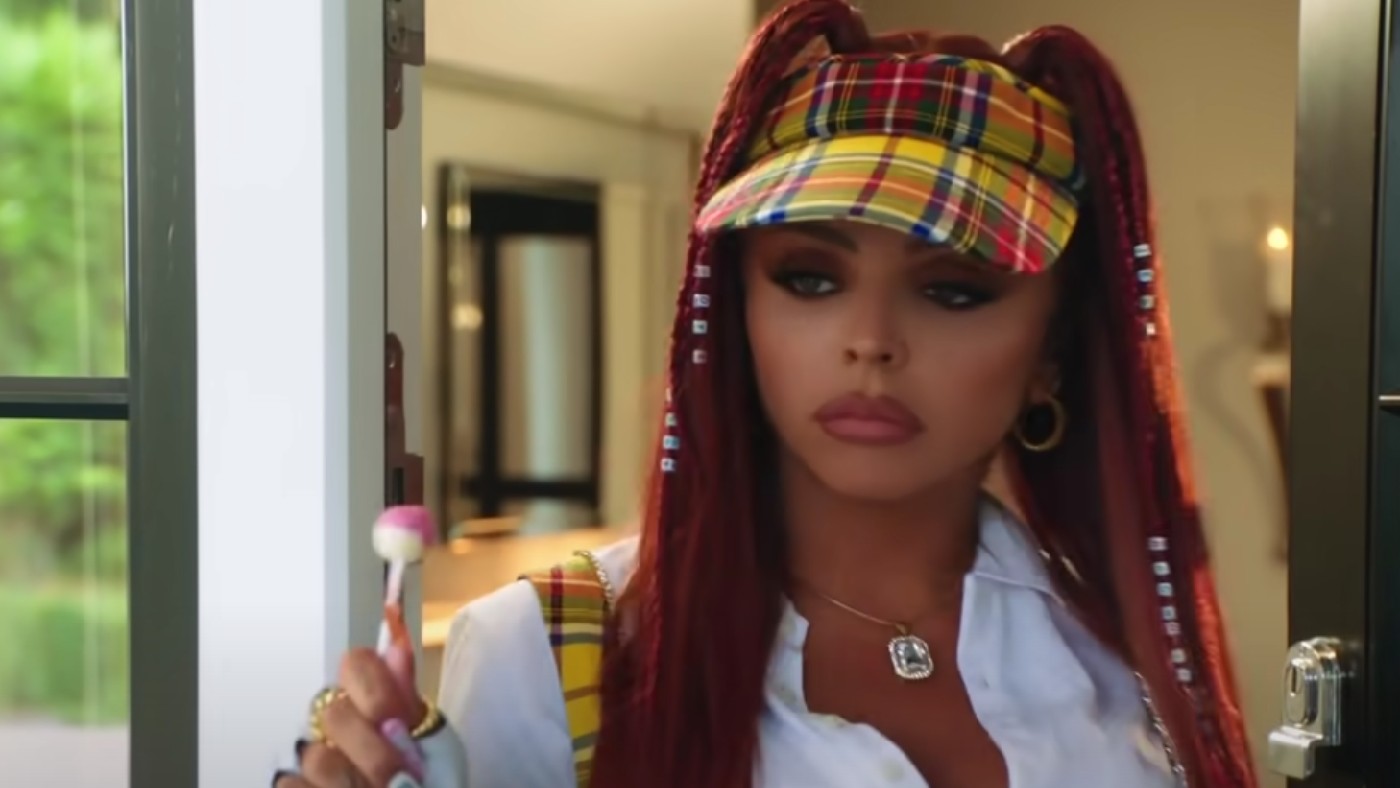Britishis Anybody Out There Im Single Funny Video

Former Piddling Mix vocaliser Jesy Nelson has been accused of "blackfishing" in her latest music video, Boyz, which samples P Diddy's vocal Bad Boy for Life and features the rapper Nicki Minaj.
In the video, Nelson, who is from Romford in east London and identifies every bit white British, is seen wearing grills on her teeth, has her hair in braids and "her skin is darkened in a mode that makes her appear nonwhite", reported The Guardian.
The popular star received widespread criticism post-obit the video's release on eight October – her first single since quitting Little Mix in Dec 2020. Nelson is "not in the video as a pale-skinned, brown-haired white lady – she's in the video equally a tan-skinned, Afro-haired white lady", make specialist Kubi Springer told The Independent.
In a conversation on Instagram Live with Minaj, Nelson said she hadn't intended to cause offence and that she simply wanted to "gloat" hip-hop and R&B music from the 1990s and 2000s "because it is what I love". She added that she had been to Antigua before the shoot, which explained why her skin looked darker.
This is not the first time that Nelson has been embroiled in a blackfishing row, nor is she the merely celebrity to have been accused of information technology; Kim Kardashian, Iggy Azalea, Selena Gomez and Ariana Grande are just a handful of the major stars who have been criticised for trying to look black by concealment their skin and adopting black hairstyles.
The term blackfishing commencement striking public consciousness in 2018, cheers to a viral Twitter thread past Toronto-based freelance writer Wanna Thompson. "The thread exposed something that I've known all along – white women want access to Blackness only don't desire the suffering that comes along with it," she wrote for Newspaper magazine that same year.
Thompson added that Instagram had become "a breeding ground" for white women wanting to capitalise off "impersonating racially ambiguous/Black women for monetary and social gain".
What is blackfishing?
Thompson defines blackfishing as "when White public figures, influencers and the like practice everything in their ability to announced Black". Speaking to CNN, she added that this could entail tanning their skin excessively "in an attempt to achieve ambiguity" or wearing "hairstyles and clothing trends that have been pioneered past Black women".
Blackfishing creates a "dangerous paradox", Thompson added, equally it enables white people to participate in black culture without taking on "the full feel of Blackness and the systemic discrimination that comes with it". Writing for The Guardian, author and activist Mikki Kendall described blackfishing as feeling "like blackface, albeit a version updated for the digital age".
The term derives from the concept of "catfishing", where a stranger creates a fictional online persona to lure someone into a relationship.
Blackfishing is different to cultural appropriation, which is defined past Oxford Dictionaries as "the unacknowledged or inappropriate adoption of the customs, practices, ideas, etc. of ane people or club by members of another and typically more dominant people or society".
On the other manus, blackfishing is "less about customs and traditions and is focused more than on the appropriating of aesthetics", explained the i news site.
What do those accused of blackfishing say?
Some, similar Nelson, contend that their pare is naturally nighttime. When the typically blonde popular star Iggy Azalea was accused of looking darker than usual in the music video for her song I Am the Strip Club, she dismissed the claims on Twitter, writing: "I'm the same colour as I always am, just in a dimly lit room with red lights."
And when Poland-built-in Instagram influencer Aga Brzostowska was accused of faking her race, she told BBC'due south Radio 1 Newsbeat that her skin is naturally "not stake".
"With things like tanning, I don't think I've washed anything in a malicious way. And then I don't feel like I need to stop doing something because... why would I stop doing something that's benefitting me or that I bask doing?" she said.
Brzostowska added that she was non suggesting "white privilege is non a thing", merely wanted to tell her critics that "the assumptions you're making are wrong".
Just the backfire against alleged blackfishing has led some influencers to rethink their public prototype. Jaiden Gumbayan, a Florida-based influencer who was criticised over her online snaps, told the broadcaster that she had realised there are "other means of showing appreciation".
"We can appreciate their culture without having to exercise or wear their hairstyles, or trying to human action or be a certain way that we're non," Gumbayan said.
Source: https://www.theweek.co.uk/98291/what-is-blackfishing